《脆弱的力量》TED观后感
ted演讲稿脆弱的力量
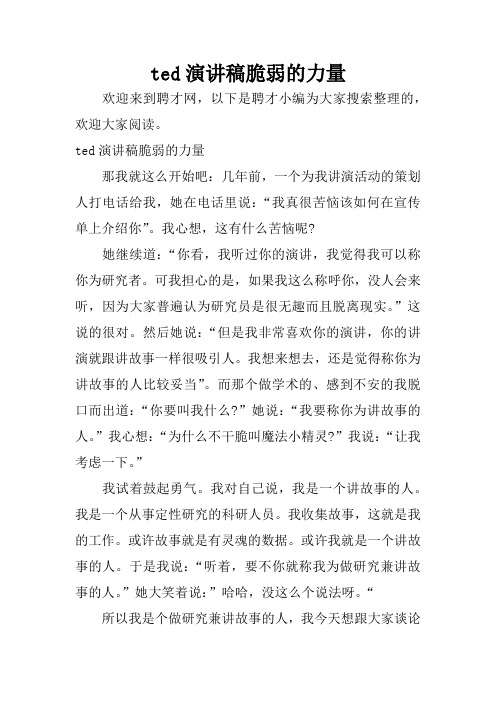
ted演讲稿脆弱的力量欢迎来到聘才网,以下是聘才小编为大家搜索整理的,欢迎大家阅读。
ted演讲稿脆弱的力量那我就这么开始吧:几年前,一个为我讲演活动的策划人打电话给我,她在电话里说:“我真很苦恼该如何在宣传单上介绍你”。
我心想,这有什么苦恼呢?她继续道:“你看,我听过你的演讲,我觉得我可以称你为研究者。
可我担心的是,如果我这么称呼你,没人会来听,因为大家普遍认为研究员是很无趣而且脱离现实。
”这说的很对。
然后她说:“但是我非常喜欢你的演讲,你的讲演就跟讲故事一样很吸引人。
我想来想去,还是觉得称你为讲故事的人比较妥当”。
而那个做学术的、感到不安的我脱口而出道:“你要叫我什么?”她说:“我要称你为讲故事的人。
”我心想:“为什么不干脆叫魔法小精灵?”我说:“让我考虑一下。
”我试着鼓起勇气。
我对自己说,我是一个讲故事的人。
我是一个从事定性研究的科研人员。
我收集故事,这就是我的工作。
或许故事就是有灵魂的数据。
或许我就是一个讲故事的人。
于是我说:“听着,要不你就称我为做研究兼讲故事的人。
”她大笑着说:”哈哈,没这么个说法呀。
“所以我是个做研究兼讲故事的人,我今天想跟大家谈论的:我们要谈论的话题是关于拓展认知。
我想给你们讲几个故事是关于我的一份研究工作,这份研究从本质上拓宽了我个人的认知,也确确实实改变了我生活、爱、工作还有教育孩子的方式。
我的故事从这里开始:当我还是个年轻的博士研究生的时候,第一年,一位研究教授对我们说:“事实是这样的,如果有一个东西你无法测量,那么它就不存在。
”我心想他只是在哄哄我们这些小孩子吧。
我说:“真的么?”他说:“这是理所当然的。
”你知道我有一个社会工作的学士文凭,一个社会工作的硕士文凭,我当时在读的是一个社会工作的博士文凭,所以我整个学术生涯都被人所包围,他们大抵相信生活是一团乱麻,接受它。
而我的观点则倾向于,生活是一团乱麻,解开它,把它整理好,再归类放入有条理的盒子里。
我当时认为我领悟到了我的方向,找到了我的工作,有能力自己去创一番事业。
《脆弱的力量》读后感

《脆弱的力量》:探索心灵深处的勇气与成长布琳·布朗的《脆弱的力量》是一本引人入胜的作品,它挑战了我们对于脆弱性的传统认知,并引导我们重新审视自身的情感与经历。
在阅读这本书的过程中,我深受启发,对于脆弱性的理解也有了全新的认识。
我们常常被那些负面的情绪所困扰,如脆弱、羞耻、恐惧和自卑。
这些情绪让我们觉得自己是不完美的,甚至阻碍了我们的成长。
然而,布朗却以独特的视角来看待这些情感。
她认为,正是这些脆弱赋予了我们力量。
在人生的道路上,我们总会遇到各种困难和挑战,而正是这些脆弱让我们更加勇敢地面对它们。
布朗的观点让我重新审视了自己的生活。
我曾经因为害怕被他人评价而隐藏自己的脆弱,但现在我明白,只有勇敢地面对自己的不完美,才能真正地成长。
这本书教会了我,拥抱自己的脆弱并不是一种软弱,而是一种勇气。
此外,书中还提到了关于全心投入生活的观点。
当我们全身心地投入到生活中,我们就能从中获得价值感和勇气。
这种投入不仅仅是一时的选择,而是一个持续的过程。
我们需要从生活中汲取力量,培养自己的勇气和仁慈心。
此外,书中还强调了爱的重要性。
无论是给予还是接受爱,都是我们生活中不可或缺的部分。
当我们学会爱自己,我们就能更好地爱他人。
这种爱并不是一种简单的情感,而是一种深深的联结和尊重。
总的来说,《脆弱的力量》是一本让人深思的作品。
它让我重新审视了自己的情感和经历,并教会了我如何勇敢地面对自己的脆弱。
这本书不仅提供了理论知识,还通过真实的案例和故事,让读者更加深入地理解脆弱性的力量。
我相信,在未来的生活中,我会更加勇敢地面对自己的脆弱,并从中汲取力量,不断成长和进步。
最后,我要感谢布琳·布朗为我们带来了这样一本启发人心的作品。
她的观点和建议不仅对于个人成长有着重要的指导意义,也对于社会的进步和发展具有积极的推动作用。
我相信,《脆弱的力量》会成为许多人心灵成长的指南,引导我们走向更加充实和有意义的生活。
TED演讲-脆弱的力量演讲稿中文翻译
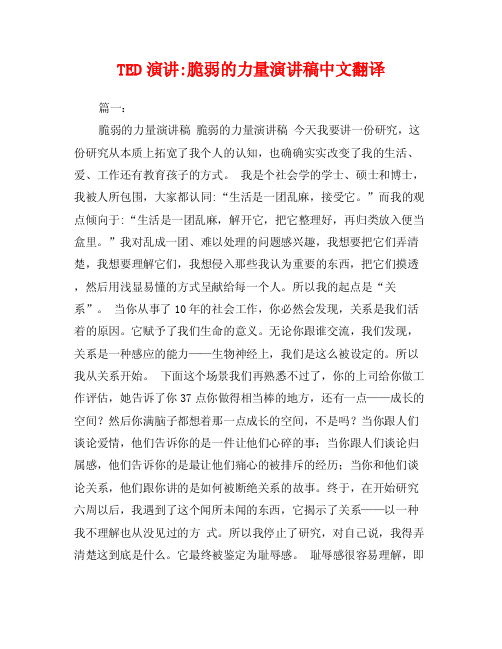
TED演讲:脆弱的力量演讲稿中文翻译篇一:脆弱的力量演讲稿脆弱的力量演讲稿今天我要讲一份研究,这份研究从本质上拓宽了我个人的认知,也确确实实改变了我的生活、爱、工作还有教育孩子的方式。
我是个社会学的学士、硕士和博士,我被人所包围,大家都认同:“生活是一团乱麻,接受它。
”而我的观点倾向于:“生活是一团乱麻,解开它,把它整理好,再归类放入便当盒里。
”我对乱成一团、难以处理的问题感兴趣,我想要把它们弄清楚,我想要理解它们,我想侵入那些我认为重要的东西,把它们摸透,然后用浅显易懂的方式呈献给每一个人。
所以我的起点是“关系”。
当你从事了10年的社会工作,你必然会发现,关系是我们活着的原因。
它赋予了我们生命的意义。
无论你跟谁交流,我们发现,关系是一种感应的能力——生物神经上,我们是这么被设定的。
所以我从关系开始。
下面这个场景我们再熟悉不过了,你的上司给你做工作评估,她告诉了你37点你做得相当棒的地方,还有一点——成长的空间?然后你满脑子都想着那一点成长的空间,不是吗?当你跟人们谈论爱情,他们告诉你的是一件让他们心碎的事;当你跟人们谈论归属感,他们告诉你的是最让他们痛心的被排斥的经历;当你和他们谈论关系,他们跟你讲的是如何被断绝关系的故事。
终于,在开始研究六周以后,我遇到了这个闻所未闻的东西,它揭示了关系——以一种我不理解也从没见过的方式。
【脆弱的力量】《脆弱的力量》读后感
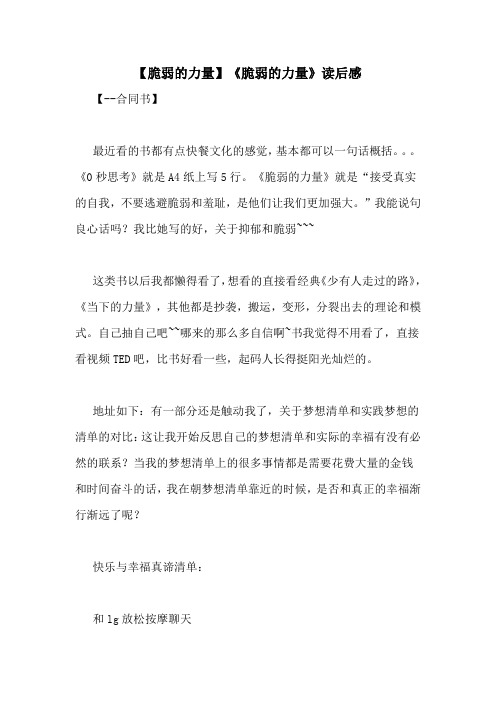
【脆弱的力量】《脆弱的力量》读后感【--合同书】
最近看的书都有点快餐文化的感觉,基本都可以一句话概括。
《0秒思考》就是A4纸上写5行。
《脆弱的力量》就是“接受真实的自我,不要逃避脆弱和羞耻,是他们让我们更加强大。
”我能说句良心话吗?我比她写的好,关于抑郁和脆弱~~~
这类书以后我都懒得看了,想看的直接看经典《少有人走过的路》,《当下的力量》,其他都是抄袭,搬运,变形,分裂出去的理论和模式。
自己抽自己吧~~哪来的那么多自信啊~书我觉得不用看了,直接看视频TED吧,比书好看一些,起码人长得挺阳光灿烂的。
地址如下:有一部分还是触动我了,关于梦想清单和实践梦想的清单的对比:这让我开始反思自己的梦想清单和实际的幸福有没有必然的联系?当我的梦想清单上的很多事情都是需要花费大量的金钱
和时间奋斗的话,我在朝梦想清单靠近的时候,是否和真正的幸福渐行渐远了呢?
快乐与幸福真谛清单:
和lg放松按摩聊天
和孩子疯玩
带孩子玩看他尽情欢乐、安全的玩乐和lg一起旅行
和朋友闲聊
吃妈妈吃的美味
看一本好书
和lg一起看一场好电影
和妈妈逛街
不攀比的家庭聚会
写一个满意的文章
感觉帮助了别人
我做的饭别人爱吃
看好看的美剧
给父母买礼物。
对比一下之前的梦想清单:好好感受一下差距。
我再好好调整一下梦想清单把~~~银行信息港总结:我的梦想清单其实就是去哪旅行哈哈。
本文:
内容仅供参考。
演讲稿 关于脆弱的力量演讲稿

关于脆弱的力量演讲稿现任TED掌门人克里斯安德森说:一次演讲令人惊奇的地方在于,你可以用几分钟的时间启发人们的思想。
这几分钟能把人从观众转变为参与者。
关键词是灵感,它更像火花、催化剂,让你参与到比自己更伟大的事情中去。
下面小编为大家整理关于脆弱的力量演讲稿,希望能帮到你。
脆弱的力量,我恨脆弱几年前,一个活动策划人打电话给我,因为我当时要做一个演讲。
她在电话里说:我真很苦恼该如何在宣传单上介绍你。
我心想怎么会苦恼呢? 她继续道:你看,我听过你的演讲,我觉得我可以称你为研究者,可我担心的是,如果我这么称呼你,没人会来听,因为大家普遍认为研究员很无趣而且脱离现实。
然后她说:但是我喜欢你的演讲,就跟讲故事一样很吸引人。
我想来想去,还是觉得称你为讲故事的人比较妥当。
而那个做学术的感到不安的我脱口而出道:你要叫我什么?她说:我要称你为讲故事的人。
我心想:为什么不干脆叫魔法小精灵?(笑声)我说:让我考虑一下。
我试着鼓起勇气。
我对自己说,我是一个讲故事的人。
我是一个从事定性研究的科研人员。
我收集故事这就是我的工作。
或许故事就是有灵魂的数据。
或许我就是一个讲故事的人。
于是我说:听着,要不你就称我为做研究兼讲故事的人。
她说:哈哈,没这么个说法呀。
所以我是个做研究兼讲故事的人,我今天想跟大家谈论的我们要谈论的话题是关于拓展认知。
我想给你们讲几个故事是关于我的一份研究的,这份研究从本质上拓宽了我个人的认知,也确确实实改变了我生活、爱、工作还有教育孩子的方式。
1、关系是我们活着的原因我的故事从这里开始。
当我还是个年轻的博士研究生的时候,第一年,有位研究教授对我们说:事实是这样的,如果有一个东西你无法测量,那么它就不存在。
我心想他只是在哄哄我们这些小孩子吧。
我说:真的么?他说:当然。
你得知道我有一个社会工作的学士文凭,一个社会工作的硕士文凭,我在读的是一个社会工作的博士文凭,所以我整个学术生涯都被人所包围,他们大抵相信生活是一团乱麻,接受它。
脆弱的力量观后感

脆弱的力量观后感对于电影《脆弱的力量》这部作品,我深受触动,产生了许多共鸣和反思。
这部电影通过细腻的演绎和人物塑造,深刻地揭示了人性的脆弱和力量,让我重新审视了自己的生活态度和价值观。
电影以故事的方式,展现了一个普通家庭的命运之旅。
从片中的人物关系、情节发展以及人物命运的变迁中,我看到了普通人面对生活中的荒诞和无奈时所展现出的巨大力量。
首先,电影剖析了人性中的脆弱。
每个人都有自己的弱点和困惑,遭遇到困境时难免会感到迷茫和恐惧。
影片中的主人公也不例外,他们面临的种种困境和压力,带来了心灵的摧残和膨胀。
而且,电影将人的脆弱表现的极淋漓尽致,无所遁形。
我从中看到了自己的影子,与人物们一起经历了那些心灵的颤栗和痛苦,感同身受。
其次,电影也展现了人性中的力量。
在绝望和困境中,人们往往能够找到内心的勇气和力量,逆境使他们更加坚定信念,迎难而上。
电影将这一力量展示的淋漓尽致,让我切身感受到力量的伟大和价值的珍贵。
人物在电影中表现出的坚韧和勇气,不禁让我思考自己在面对逆境时是否能够保持同样的积极和乐观的态度。
另外,电影中的家庭关系也给我留下了深刻的印象。
家庭是一个人一生中最重要的凝聚力量,也是最重要的情感寄托。
电影中的家庭关系显得非常真实和细腻,展现了家庭成员之间的牵绊和纠葛。
这些情感纠葛在面对外部压力时变得更加严峻和脆弱,但正是这种家庭的力量,使得人们能够战胜困境,迎接未来。
最后,电影中的情节发展和结局也给我留下了很深的思考。
电影并没有给出一个完美的结局,而是通过凸显人物在面对逆境时的心路历程,引发观众对于人生和命运的思考。
在现实生活中,我们也经常会碰到各种各样的困境,也许并不如电影中的那么戏剧化,但人性的脆弱和力量的对决却是存在的。
电影给了我勇气去面对这些困难和不堪,同时也让我明白,每个人都需要对生活保持一份积极乐观的态度,才能够克服困境,追求自己的梦想。
电影《脆弱的力量》的深刻意义在于,它不仅仅是娱乐作品,更是一部能够引发观众内心共鸣和深思的作品。
Ted演讲稿脆弱的力量
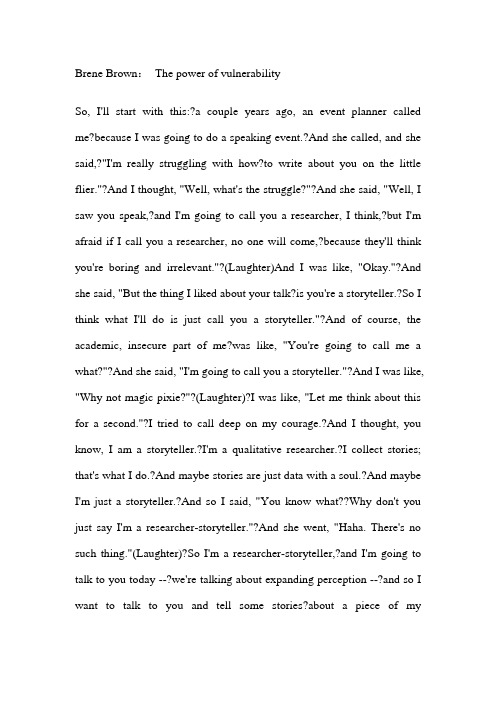
Brene Brown:The power of vulnerabilitySo, I'll start with this:?a couple years ago, an event planner called me?because I was going to do a speaking event.?And she called, and she said,?"I'm really struggling with how?to write about you on the little flier."?And I thought, "Well, what's the struggle?"?And she said, "Well, I saw you speak,?and I'm going to call you a researcher, I think,?but I'm afraid if I call you a researcher, no one will come,?because they'll think you're boring and irrelevant."?(Laughter)And I was like, "Okay."?And she said, "But the thing I liked about your talk?is you're a storyteller.?So I think what I'll do is just call you a storyteller."?And of course, the academic, insecure part of me?was like, "You're going to call me a what?"?And she said, "I'm going to call you a storyteller."?And I was like, "Why not magic pixie?"?(Laughter)?I was like, "Let me think about this for a second."?I tried to call deep on my courage.?And I thought, you know, I am a storyteller.?I'm a qualitative researcher.?I collect stories; that's what I do.?And maybe stories are just data with a soul.?And maybe I'm just a storyteller.?And so I said, "You know what??Why don't you just say I'm a researcher-storyteller."?And she went, "Haha. There's no such thing."(Laughter)?So I'm a researcher-storyteller,?and I'm going to talk to you today --?we're talking about expanding perception --?and so I want to talk to you and tell some stories?about a piece of myresearch?that fundamentally expanded my perception?and really actually changed the way that I live and love?and work and parent.And this is where my story starts.?When I was a young researcher, doctoral student,?my first year I had a research professor?who said to us,?"Here's the thing,?if you cannot measure it, it does not exist."?And I thought he was just sweet-talking me.?I was like, "Really?" and he was like, "Absolutely."?And so you have to understand?that I have a bachelor's in social work, a master's in social work,?and I was getting my Ph.D. in social work,?so my entire academic career?was surrounded by people?who kind of believed?in the "life's messy, love it."?And I'm more of the, "life's messy,?clean it up, organize it?and put it into a bento box."?(Laughter)?And so to think that I had found my way,?to found a career that takes me --?really, one of the big sayings in social work?is, "Lean into the discomfort of the work."?And I'm like, knock discomfort upside the head?and move it over and get all A's.?That was my mantra.?So I was very excited about this.?And so I thought, you know what, this is the career for me,?because I am interested in some messy topics.?But I want to be able to make them not messy.?I want to understand them.?I want to hack into these things?I know are important?and lay the code out for everyone to see.So where I started was with connection.?Because, by the time you're a social worker for 10 years,?what you realize?is that connection is why we're here.?It's what gives purpose and meaning to our lives.?This is what it's all about.?It doesn't matter whether you talk to peoplewho work in social justice and mental health and abuse and neglect,?what we know is that connection,?the ability to feel connected, is --?neurobiologically that's how we're wired --?it's why we're here.?So I thought, you know what, I'm going to start with connection.?Well, you know that situation?where you get an evaluation from your boss,?and she tells you 37 things you do really awesome,?and one thing -- an "opportunity for growth?"?(Laughter)?And all you can think about is that opportunity for growth, right??Well, apparently this is the way my work went as well,?because, when you ask people about love,?they tell you about heartbreak.?When you ask people about belonging,?they'll tell you their most excruciating experiences?of being excluded.?And when you ask people about connection,?the stories they told me were about disconnection.So very quickly -- really about six weeks into this research --?I ran into this unnamed thing?that absolutely unraveled connection?in a way that I didn't understand or had never seen.?And so I pulled back out of the research?and thought, I need to figure out what this is.?And it turned out to be shame.?And shame is really easily understood?as the fear ofdisconnection:?Is there something about me?that, if other people know it or see it,?that I won't be worthy of connection??The things I can tell you about it:?it's universal; we all have it.?The only people who don't experience shame?have no capacity for human empathy or connection.?No one wants to talk about it,?and the less you talk about it the more you have it.?What underpinned this shame,?this "I'm not good enough," --?which we all know that feeling:?"I'm not blank enough. I'm not thin enough,?rich enough, beautiful enough, smart enough,?promoted enough."?The thing that underpinned this?was excruciating vulnerability,?this idea of,?in order for connection to happen,?we have to allow ourselves to be seen,?really seen.And you know how I feel about vulnerability. I hate vulnerability.?And so I thought, this is my chance?to beat it back with my measuring stick.?I'm going in, I'm going to figure this stuff out,I'm going to spend a year, I'm going to totally deconstruct shame,?I'm going to understand how vulnerability works,?and I'm going to outsmart it.?So I was ready, and I was really excited.As you know, it's not going to turn out well.?(Laughter)?You know this.?So, I could tell you a lot about shame,?but I'd have to borrow everyone else's time.?But here's what I can tell you that it boils down to --?and this may be one of the most important things that I've ever learned?in the decade of doing this research.?My one year?turned into six years:?thousands of stories,hundreds of longinterviews, focus groups.?At one point, people were sending me journal pagesand sending me their stories --?thousands of pieces of data in six years.?And I kind of got a handle on it.I kind of understood, this is what shame is,?this is how it works.?I wrotea book,?I published a theory,?but something was not okay --?and what it was is that,?if I roughly took the people I interviewed?and divided them into people?who really have a sense of worthiness --?that's what this comes down to,?a sense of worthiness --?they have a strong sense of love and belonging --and folks who struggle for it,?and folks who are always wondering if they're good enough.There was only one variable?that separated the people who have?a strong sense of love and belonging?and the people who really struggle for it.?And that was, the people who have?a strong sense of love and belonging?believe they're worthy of love and belonging.?That's it.They believe they're worthy.?And to me, the hard part?of the one thing that keeps us out of connection?is our fear that we're not worthy of connection,?was something that, personally and professionally,?I felt like I needed to understand better.?So what I did?is I took all of the interviews?where I saw worthiness, where I saw people living that way,?and just looked at those.What do these people have in common??I have a slight office supply addiction,?but that's another talk.?So I had a manila folder, and I had aSharpie,?and I was like, what am I going to call this research??And the first words that came to my mind?were whole-hearted.?These are whole-hearted people, living from this deep sense of worthiness.?So I wrote at the top of the manila folder,?and I started looking at the data.?In fact, I did it first?in a four-day?very intensive data analysis,?where I went back, pulled these interviews, pulled the stories, pulled the incidents.What's the theme? What's the pattern??My husband left town with the kids?because I always go into this Jackson Pollock crazy thing,?where I'm just like writing?and in my researcher mode.And so here's what I found.?What they had in common?was a sense of courage.?And I want to separate courage and bravery for you for a minute.?Courage, the original definition of courage,when it first came into the English language --?it's from the Latin word cor, meaning heart --and the original definition?was to tell the story of who you are with your whole heart.?And so these folks?had, very simply, the courage?to be imperfect.?They had the compassion?to be kind to themselves first and then to others,?because, as it turns out, we can't practice compassion with other people?if we can't treat ourselves kindly.?And the last was they had connection,?and -- this was the hard part --?as a result of authenticity,?they were willing to let go of who they thought they should be?in order to be who they were,?which you have to absolutely do thatfor connection.The other thing that they had in common?was this:?They fully embraced vulnerability.?They believed?that what made them vulnerable?made them beautiful.?They didn't talk about vulnerability?being comfortable,?nor did they really talk about it being excruciating --?as I had heard it earlier in the shame interviewing.?They just talked about it being necessary.?They talked about the willingness?to say, "I love you" first,?the willingness?to do something?where there are no guarantees,?the willingness?to breathe through waiting for the doctor to call?after your mammogram.?They're willing to invest in a relationship?that may or may not work out.They thought this was fundamental.I personally thought it was betrayal.?I could not believe I had pledged allegiance?to research, where our job --?you know, the definition of research?is to control and predict, to study phenomena,?for the explicit reason?to control and predict.?And now my mission?to control and predict?had turned up the answer that the way to live is with vulnerability?and to stop controlling and predicting.?This led to a little breakdown --?(Laughter)?-- which actually looked more like this.?(Laughter)?And it did.?I call it a breakdown; my therapist calls it a spiritual awakening.?A spiritual awakening sounds better than breakdown,?but I assure you it was a breakdown.?And I had to put my data away and go find a therapist.?Let me tell you something: you know who you are?when you call your friends and say, "I think I need to seesomebody.Do you have any recommendations?"?Because about five of my friends were like,?"Wooo. I wouldn't want to be your therapist."?(Laughter)?I was like, "What does that mean?"?And they're like, "I'm just saying, you know.?Don't bring your measuring stick."?I was like, "Okay."So I found a therapist.?My first meeting with her, Diana --?I brought in my list?of the way the whole-hearted live, and I sat down.?And she said, "How are you?"?And I said, "I'm great. I'm okay."?She said, "What's going on?"?And this is a therapist who sees therapists,?because we have to go to those,?because their B.S. meters are good.?(Laughter)?And so I said,?"Here's the thing, I'm struggling."?And she said, "What's the struggle?"?And I said, "Well, I have a vulnerability issue.?And I know that vulnerability is the core?of shame and fear?and our struggle for worthiness,?but it appears that it's also the birthplace?of joy, of creativity,?of belonging, of love.?And I think I have a problem,?and I need some help."?And I said, "But here's the thing:?no family stuff,?no childhood shit."?(Laughter)?"I just need some strategies."?(Laughter)?(Applause)Thank you.?So she goes like this.?(Laughter)?And then I said, "It's bad, right?"?And she said, "It's neither good nor bad."?(Laughter)?"It just is what it is."?And I said, "Oh my God, this is going to suck."(Laughter)And it did, and it didn't.?And it took about a year.?And you know how there are people?that, when they realize that vulnerability and tenderness are important,?that they surrender and walk into it.?A: that's not me,?and B: I don't even hang out with people like that.?(Laughter)?For me, it was a yearlong street fight.?It was a slugfest.?Vulnerability pushed, I pushed back.?I lost the fight,?but probably won my life back.And so then I went back into the research?and spent the next couple of years?really trying to understand what they, the whole-hearted,?what choices they were making,?and what are we doing?with vulnerability.?Why do we struggle with it so much??Am I alone in struggling with vulnerability??No.?So this is what I learned.?We numb vulnerability --?when we're waiting for the call.?It was funny, I sent something out on Twitter and on Facebook?that says, "How would you define vulnerability??What makes you feel vulnerable?"?And within an hour and a half, I had 150 responses.?Because I wanted to know?what's out there.?Having to ask my husband for help?because I'm sick, and we're newly married;?initiating sex with my husband;?initiating sex with my wife;?being turned down; asking someone out;?waiting for the doctor to call back;getting laid off; laying off people --?this is the world we livein.?We live in a vulnerable world.?And one of the ways we deal with it?is we numb vulnerability.And I think there's evidence --?and it's not the only reason this evidence exists,?but I think it's a huge cause --?we are the most in-debt,?obese,?addicted and medicated?adult cohort in U.S. history.?The problem is -- and I learned this from the research --?that you cannot selectively numb emotion.?You can't say, here's the bad stuff.?Here's vulnerability, here's grief, here's shame,?here's fear, here's disappointment.?I don't want to feel these.?I'm going to have a couple of beers and a banana nut muffin.?(Laughter)?I don't want to feel these.?And I know that's knowing laughter.?I hack into your lives for a living.?God.?(Laughter)?You can't numb those hard feelings?without numbing the other affects, our emotions.?You cannot selectively numb.?So when we numb those,?we numb joy,?we numb gratitude,?we numb happiness.?And then we are miserable,?and we are looking for purpose and meaning,?and then we feel vulnerable,?so then we have a couple of beers and a banana nut muffin.?And it becomes this dangerous cycle.One of the things that I think we need to think about?is why and how we numb.?And it doesn't just have to be addiction.?The other thing we do?is we make everything that's uncertain certain.?Religion has gone from abelief in faith and mystery?to certainty.?I'm right, you're wrong. Shut up.?That's it.?Just certain.?The more afraid we are, the more vulnerable we are,?the more afraid we are.?This is what politics looks like today.?There's no discourse anymore.?There's no conversation.?There's just blame.?You know how blame is described in the research??A way to discharge pain and discomfort.?We perfect.?If there's anyone who wants their life to look like this, it would be me,?but it doesn't work.?Because what we do is we take fat from our butts?and put it in our cheeks.?(Laughter)?Which just, I hope in 100 years,?people will look back and go, "Wow."(Laughter)And we perfect, most dangerously,?our children.?Let me tell you what we think about children.They're hardwired for struggle when they get here.?And when you hold those perfect little babies in your hand,?our job is not to say, "Look at her, she's perfect.?My job is just to keep her perfect --?make sure she makes the tennis team by fifth grade and Yale by seventh grade."That's not our job.?Our job is to look and say,?"You know what? You're imperfect, and you're wired for struggle,?but you are worthy of love and belonging."?That's our job.?Show me a generation of kids raised like that,?and we'll end the problems I think that we see today.?We pretend that what we do?doesn't have an effect on people.?Wedo that in our personal lives.We do that corporate --?whether it's a bailout, an oil spill,?a recall --?we pretend like what we're doing?doesn't have a huge impact on other people.?I would say to companies, this is not our first rodeo, people.?We just need you to be authentic and real?and say, "We're sorry.?We'll fix it."But there's another way, and I'll leave you with this.?This is what I have found:?to let ourselves be seen,?deeply seen,?vulnerably seen;?to love with our whole hearts,?even though there's no guarantee --?and that's really hard,?and I can tell you as a parent, that's excruciatingly difficult --?to practice gratitude and joy?in those moments of terror,?when we're wondering, "Can I love you this much??Can I believe in this this passionately??Can I be this fierce about this?"?just to be able to stop and, instead of catastrophizing what might happen,?to say, "I'm just so grateful,?because to feel this vulnerable means I'm alive."?And the last, which I think is probably the most important,?is to believe that we're enough.?Because when we work from a place,?I believe, that says, "I'm enough,"?then we stop?screaming and start listening,?we're kinder and gentler to the people around us,?and we're kinder and gentler to ourselves.That's all I have. Thank you.(Applause)。
有关脆弱的力量发言稿
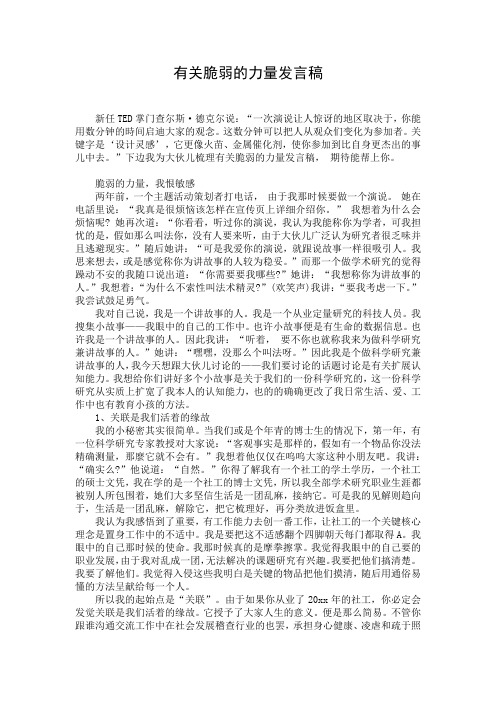
有关脆弱的力量发言稿新任TED掌门查尔斯·德克尔说:“一次演说让人惊讶的地区取决于,你能用数分钟的時间启迪大家的观念。
这数分钟可以把人从观众们变化为参加者。
关键字是‘设计灵感’,它更像火苗、金属催化剂,使你参加到比自身更杰出的事儿中去。
”下边我为大伙儿梳理有关脆弱的力量发言稿,期待能帮上你。
脆弱的力量,我恨敏感两年前,一个主题活动策划者打电话,由于我那时候要做一个演说。
她在电話里说:“我真是很烦恼该怎样在宣传页上详细介绍你。
” 我想着为什么会烦恼呢? 她再次道:“你看看,听过你的演说,我认为我能称你为学者,可我担忧的是,假如那么叫法你,没有人要来听,由于大伙儿广泛认为研究者很乏味并且逃避现实。
”随后她讲:“可是我爱你的演说,就跟说故事一样很吸引人。
我思来想去,或是感觉称你为讲故事的人较为稳妥。
”而那一个做学术研究的觉得躁动不安的我随口说出道:“你需要要我哪些?”她讲:“我想称你为讲故事的人。
”我想着:“为什么不索性叫法术精灵?”(欢笑声)我讲:“要我考虑一下。
”我尝试鼓足勇气。
我对自己说,我是一个讲故事的人。
我是一个从业定量研究的科技人员。
我搜集小故事——我眼中的自己的工作中。
也许小故事便是有生命的数据信息。
也许我是一个讲故事的人。
因此我讲:“听着,要不你也就称我来为做科学研究兼讲故事的人。
”她讲:“嘿嘿,没那么个叫法呀。
”因此我是个做科学研究兼讲故事的人,我今天想跟大伙儿讨论的——我们要讨论的话题讨论是有关扩展认知能力。
我想给你们讲好多个小故事是关于我们的一份科学研究的,这一份科学研究从实质上扩宽了我本人的认知能力,也的的确确更改了我日常生活、爱、工作中也有教育小孩的方法。
1、关联是我们活着的缘故我的小秘密其实很简单。
当我们或是个年青的博士生的情况下,第一年,有一位科学研究专家教授对大家说:“客观事实是那样的,假如有一个物品你没法精确测量,那麼它就不会有。
”我想着他仅仅在呜呜大家这种小朋友吧。
- 1、下载文档前请自行甄别文档内容的完整性,平台不提供额外的编辑、内容补充、找答案等附加服务。
- 2、"仅部分预览"的文档,不可在线预览部分如存在完整性等问题,可反馈申请退款(可完整预览的文档不适用该条件!)。
- 3、如文档侵犯您的权益,请联系客服反馈,我们会尽快为您处理(人工客服工作时间:9:00-18:30)。
《脆弱的力量》TED观后感
每个人都有他脆弱的时候,即使他在人前是看似多么的坚强。
人有时坚不可摧,有时脆弱得一击即垮。
但是脆弱并不应该是避而不谈的,就算我们清楚地知道脆弱背后的情绪是恐惧和羞愧,为什么我们感觉到脆弱?因为恐惧和羞愧。
TED视频中的社会学家在收集研究脆弱命题的相关数据时,发现可根据脆弱与否分为两类人,一类是总是提起自己伤心的过往以及不幸的时刻,凡是遇到相似的情况就会选择逃避退缩;而另一类人承认脆弱是必须的,但依然全心全意地去爱,去拥抱生活,即使过去曾带给自己伤害。
任何人在脆弱的时候都尝试逃离这种难受的状态,或者试图用外物比如酒精药物来麻醉自己,但是一旦停止外物麻醉,重新回到现实来情绪不免更加低落,因而需要更多的酒精和药物麻痹自己,难以拥抱脆弱的人最终就会陷入这种恶性循环。
“你知道吗?你并不完美,你注定要奋斗,但是你值得被爱,值得享有归属感。
”因为不完美,恐惧和羞愧让自己感觉脆弱,但是如果选择因脆弱而奋斗,并非自暴自弃的话,那么脆弱将让自己成长,让自己反思,让自己重新振作起来面对生活。
在“breakdown"的同时,也是“spiritual awakening"的时刻,脆弱让灵魂解放,重新思考人生,总结经验教训,才能以更强大的内心踏上未来新旅程。
